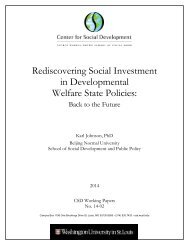Exploring and Assessing Intercultural Competence - Center for ...
Exploring and Assessing Intercultural Competence - Center for ...
Exploring and Assessing Intercultural Competence - Center for ...
You also want an ePaper? Increase the reach of your titles
YUMPU automatically turns print PDFs into web optimized ePapers that Google loves.
A. About the Federation EIL<br />
<strong>Exploring</strong> <strong>and</strong> <strong>Assessing</strong> <strong>Intercultural</strong> <strong>Competence</strong><br />
1. Overview of the Initial Phase Project<br />
The Federation of The Experiment in International Living (aka: FEIL, or Federation EIL),<br />
founded in 1932, is one of the oldest <strong>and</strong> premiere international, intercultural educational<br />
organizations in the world today. Through its Member Organizations (MOs) – all independent,<br />
non-profit, <strong>and</strong> autonomous national entities – FEIL constitutes a worldwide network with<br />
representation in 26 countries (cf. Appendix B: FEIL <strong>and</strong> Its Member Organizations). From the<br />
very beginning, their collective mission has been: “to build world peace, one person at a time”<br />
(cf. Appendix A: FEIL’s Vision <strong>and</strong> Mission Statements). Over the past three quarters of a<br />
century, several hundred thous<strong>and</strong> individuals of all ages have participated in FEIL programs<br />
through the combined ef<strong>for</strong>ts of its MOs around the world.<br />
FEIL MOs work toward this mission by providing a variety of programs in education, service,<br />
<strong>and</strong> development. These programs are conducted among Federation members as well as with<br />
other partners around the world that share similar beliefs <strong>and</strong> practices. To ensure consistent<br />
quality, the Federation adheres to a set of Operational St<strong>and</strong>ards that guide members in their<br />
work, along with a Quality Assurance Form that serves as an ongoing review instrument.<br />
FEIL programs are designed <strong>and</strong> conducted by at least two collaborating partners (<strong>and</strong> sometimes<br />
more in the case of multinational groups). In all educational programs, a group leader <strong>and</strong> a local<br />
representative from each host community work together as the program unfolds. In service <strong>and</strong><br />
development programs, the addition of a mentor provides local worksite orientation <strong>and</strong> guides<br />
each volunteer throughout the service component. All FEIL programs include pre-departure<br />
orientation, host country orientation, language training, a family homestay (the hallmark of The<br />
Experiment), <strong>and</strong> a thematic focus or a service project.<br />
B. The Federation’s Research Interests<br />
Although touted as an “intercultural educational experience,” little systematic study had been<br />
previously conducted to document exactly what transpires in an Experiment program <strong>and</strong> the<br />
effects on sojourners <strong>and</strong> hosts alike. Over the years, significant testimony has been accrued in<br />
the <strong>for</strong>m of personal accounts, anecdotal tales, <strong>and</strong> autobiographical writings that attest to the<br />
impact that programs exert on the lives of those involved. This aside, however, inadequate<br />
<strong>for</strong>mal research existed to document explicitly the impact of living abroad, study abroad,<br />
service abroad, <strong>and</strong> other <strong>for</strong>ms of intercultural contact on all parties. Although few would<br />
deny the provocative <strong>and</strong> enriching nature of these experiences in producing significant lifechanges,<br />
it was time to learn more. Moreover, given the slogan: “FEIL: An acknowledged leader<br />
in the field of intercultural educational exchange,” recently adopted (Brazil General Assembly,<br />
April 2006), it was essential that thoughtful research <strong>and</strong> clearly documented evidence back up<br />
this claim.<br />
As a result, FEIL <strong>for</strong>mulated a long-term plan to conduct a global, longitudinal, <strong>and</strong> crosssectional<br />
research study to investigate just this. In fact, it recognized that only by assessing the<br />
impact of programs upon participants can attainment of the organizational mission be<br />
appropriately measured. But, what constitutes this impact – i.e., what exactly are the changes <strong>and</strong><br />
the factors responsible <strong>for</strong> them? These questions <strong>for</strong>med the basis <strong>for</strong> the issues raised in this<br />
<strong>Center</strong> <strong>for</strong> Social Development<br />
Washington University in St. Louis<br />
7
















